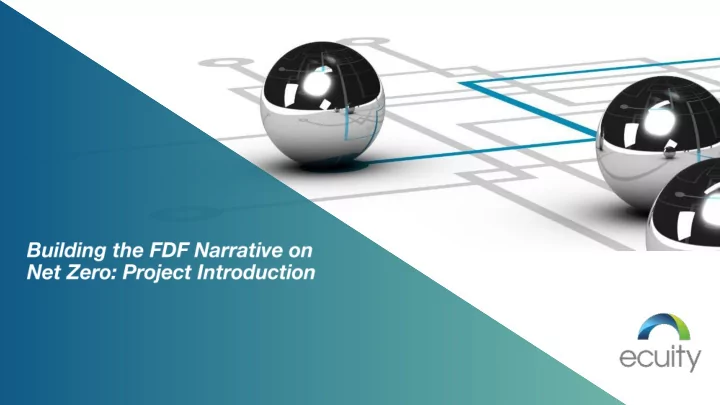

About Us
About Us
Evidence Based Influence
Experience and Partners Utilities & Trade Fuel Supply and Innovation Public Sector Financial Associations Networks Services
The Net Zero Target • • • •
Where do things currently stand? • •
Where do things currently stand?
What changes are needed to reach net zero? • • Source: CCC Net Zero Report
Where do things stand in the food and drink sector? • • •
What are the advised changes for the food and drink sector? • • Source: Element Energy Source: CCC Land Use Report, CCC Net Zero Report
Concluding thoughts • • • •
• •
FDF activities over 2020 • Industrial Energy Transformation Fund • Climate Change Agreements – extension & future scheme • From 1 st Jan 2021: UKETS / carbon emissions tax? • FDF/SLR heat decarbonisation report • Ambition 2025 – mid-term review
FDF / SLR Report • FDF / SLR report on decarbonising heat, published 10 th June 2020 • Press Release • Final report
Business as Usual A business as usual (BAU) emissions trajectory based on 2012 to 2050 has been established to understand what the emissions from heat are likely to be under normal circumstances. 97% of these emissions come from natural gas. We have focussed on the emissions from FDF members in the EU Emissions Trading Scheme and all the emissions in the FDF’s food and drink manufacturing Climate Change Agreement (CCA): the ‘FDF sub - sector’. 25
Options to decarbonise heat Research undertaken by FDF in 2012 and 2020 identified the equipment and processes that generate and use heat across the ‘FDF sub - sector’. Boilers and direct fired ovens use over 80% of the energy used to provide heat to the manufacturing processes. There are a number of technological options for decarbonising heat use from direct and indirect fired users. 26
Barriers and Enablers ....... 27
FDF research activities .... • IDRIC (Industrial Decarbonisation Research and Innovation Centre) and the Industrial Clusters • Supporting bids for university funding on decarbonising heat in food and drink manufacturing, and on decarbonising the cold chain • WRAP / Courtauld & supply chain emissions
Forthcoming policies • Energy White Paper (Autumn 2020) • Heat and Buildings Strategy (Autumn 2020) • Interim HM Treasury report on costs of meeting net zero (Autumn 2020) • Climate Change Committee report on sectoral decarbonisation pathways (December 9 th 2020) • Industrial Decarbonisation Strategy (Spring 2021) • HM Treasury report on costs of meeting net zero (Spring 2021) • National Food Strategy part 2 (Spring 2021) – to build on (in part) on the CCC’s land use and net zero report from Jan 2020?
Next steps .... • Momentum of government consultations and strategies relating to decarbonisation is increasing • A green recovery post Covid-19 • Energy costs & costs of carbon – with impacts across the supply chain • FDF is one of the delivery partners for BEIS SME engagement strategy on net zero for Agriculture, Food and Drink • COP 26 – role for food and drink sector Need for holistic FDF narrative on net zero!
FDF Narrative Project • How do we support our members / influence and respond to these forthcoming publications? • How can we help the sector prepare? What does a supportive policy framework look like? • What are the wider implications of net zero? • Carbon costs will be embedded in supply chain for all inputs – as well as onsite emissions – impacts on competitiveness • Need for a holistic overview / understanding
FDF Narrative Project • What net zero means to food and drink manufacturing (scope 1, 2 and 3 emissions) • A baseline view of where the sector is on targets • Measures to reduce onsite emissions • Views on policy / regulatory landscape to reduce onsite emissions to net zero → policy asks • Scope 3 / supply chain emission work to be developed at FDF post Ecuity project
•
It is important for FDF to understand better the impact of the green transition, relevant risks/opportunities and develop a position grounded on evidence-based asks. Your responses to the survey / interviews will help provide that evidence base but could you share more? We would like to include specific examples of decarbonization activities, low carbon strategies or projects in our summary report so please do share these.
Recommend
More recommend